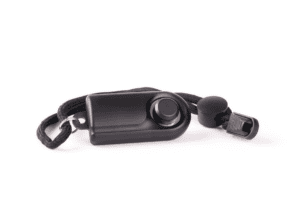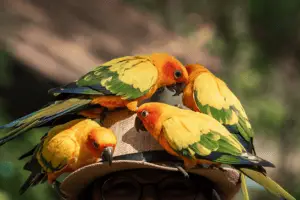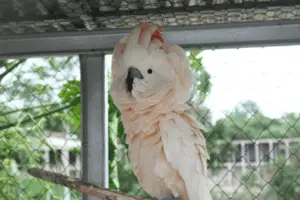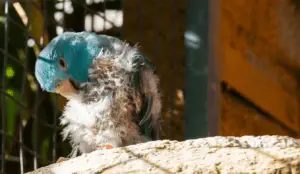Parrots make great companions, especially those that mimic most sounds around them. If you want a pet that can imitate your speech and over 200 sounds, then the African gray parrot is the way to go. The amount of fun you can have with this pet will depend on how much you two bond. The relationship between you two matters a lot, which begs the question, what is the best age to get an African Gray parrot?
Key Takeaways
- The best time to adopt an African Gray parrot is immediately after weaning. At that point, they can eat pellets and have received the necessary vaccines.
- A mature bird can make a great pet, but you must be patient, especially if it is a rescue that has been through tough times.
- Before adopting any pet, examining its body for any signs of disease is best.
- Bring your kids or roommates when introducing yourself to your preferred baby Gray parrot. After all, you will be living in the same house, and they will interact with each other at some point.
The African gray parrot matures between the ages of 4 and 6, but experts say that adopting these birds between 2 to 6 months is best. You can bond with your pet at this age and create a parrot and parent relationship that will last a lifetime.
Bonding with your pet while young can create a lifelong relationship; they get pretty attached to their owners.
In this article, we’ll answer the question: what is the best age to get an African gray? We’ll also show you how to pick a baby parrot and bond with your pet while young.
Do African Gray Parrots Make Great Pets?
Bird lovers, particularly parrot owners, love having fun with their pets while teaching them several sounds and words. The idea of your pet greeting you when you arrive home in the evening or saying goodbye when you leave is impressive. Dogs can do that, but what would you do if your pet could talk to you daily?
Well, an African gray parrot can do that and more. These birds demand over five hours of socialization daily, which means you have a great companion for life. So here is why they can make excellent pets:
They’re Intelligent Creatures
Parrots make excellent pets, particularly the African gray parrots. They’re intelligent creatures that you can teach them many words and tricks. A study published in the Harvard Gazette confirmed that they could do cognitive tasks beyond a five-year-old kid. The Gray parrot known as Griffin rewrote some of the regulations of avian intelligence.
On the other hand, people could find and return an escaped African Gray parrot in Japan, thanks to the fact that it kept repeating its owner’s address and name. Therefore, these intelligent creatures have great memories and can do anything to be returned to their owners, especially if you have a great bond.
They’re Not The Screaming Type
Unlike most parrots, the Grays parrots are not the screaming type, so they would rarely disrupt your neighbors or make your home noisy. Therefore, they’re quite homely, and the fact that they love socializing with their owners makes them the best option for pet lovers. They tick most of the boxes on my list that makes a great pet.
An African Gray parrot is a suitable option if you live in an apartment.
They Love Socializing With Their Owners
They’re intelligent creatures that can develop a strong bond with their owner and be in tune with the emotions of their owners. They require over five hours of socialization with their owners every day.
On top of that, their intelligence level makes them the easiest parrots to train. But inexperienced parrot owners must learn several techniques before handling this species.
They’re social species that rely on flock-type structures even in captivity since they depend on other birds in their flock. In captivity, they will use a considerable percentage of their speech and vocal capability to interact with humans.
The captive and wild parrots use contact calls that let them interact with other birds and share their locations, safety status, availability of food, and predators. For the ones in captivity, contact calls come in handy when creating a strong social bond with their owners.
What Is The Best Age To Get An African Gray Parrot?
The best time to adopt any parrot is immediately after the weaning process; most experts advise against adopting a parrotlet before six weeks old. Generally, the weaning time for most parrots is between 6 and 10 weeks which in most cases is over two months.
Fortunately, most breeders sell their parrotlet at different ages, which is between 2 and 3 months for most species.
Unfortunately, there is no straight answer to when a young parrot should leave the comfort of their parents. But the best time is usually after weaning; in our case, the best time is between 2 and 6 months. At six months, it’s healthy enough to survive without its parents; plus, it has received most of its vaccines.
At six months, you can be sure it will thrive to maturity if well-taken care of. Therefore, you can replace the role its mother plays in its life and start bonding with it at this age.
So how can you tell if it’s under six months old and ready to be adopted? Well, it’s simple, the best way to determine the age of your African Gray parrot is by looking at its eyes. The color of the eyes of a 6-month-old Gray parrot is either black or dark Gray.
Knowing how to determine its age guarantees you the right baby parrot. It will protect you from any breeder planning on tricking you into purchasing an older bird.
Is It A Good Idea To Adopt A Mature African Gray Parrot?

Yes and no; if you want to create an exceptional bond with your pet, you should always get it while it’s still young. When young, it will depend on you, making it easy for you to bond with it and create a lasting relationship.
But when mature, it doesn’t need you that much; with food and toys, it may not even need your presence. On the other hand, if it’s a rescue, it might have already bonded with another person, so that it will require patience.
Plus, the training process can be intense; for instance, they can be aggressive if you make a mistake when training. They can lose patience quickly, but the young will be eager to try new things. Fortunately, you can still create a relationship, and if your main goal is breeding, then a mature bird can come in handy.
Where Can I Buy a Baby African Gray Parrot?
The best place to get a baby African Gray parrot is from breeders. Breeders have several pets at a young age, but you may have to spend over $1,000 on them. Unfortunately, looking for one from a rescue place or shelter is not a good idea. And that is because the shelter has no say on the parrot age they can rescue.
Therefore, you are less likely to get a young pet from the shelter. Plus, you won’t have the history of its parents, which helps determine if it has hereditary diseases. Do not purchase it from any breeder. You must research and compare many facilities before settling on the right option.
How Do I Choose An African Gray Baby?
If you plan on adopting a Gray parrot, you must be ready to spend much time caring for it. Remember, it’s one of the most expensive parrots available, so getting your budget in order from the start is best. Plus, it can live for up to 60 years in captivity.
It means doing everything right from the start. It is best to purchase the right parrot from an experienced breeder willing to help you when necessary. So if you want to know how to pick the right African Gray baby, please read on.
Determine The Kind Of Gray Parrot You Need
After deciding on the African Gray as your first or next pet, determining which species you require is the next step. Generally, there are two types of Gray parrots, the Timneh and the Congo Gray. The Timneh Gray parrot is mild-mannered and smaller than the Congo African Gray. The Congo parrot has a maximum length of about 13 inches and a red tail. On the other hand, Timneh Grays can grow around 11 inches long.
The Congo Grays weigh about a pound, while Timneh Grays are about 0.75 pounds. When mature, the Gray parrot’s weight and size can help you determine the type of baby African Gray to adopt.
You can also go for a mixture of Congo and Timneh African Gray if you want both traits. A hybrid can come in handy when it comes to preventing some common ailments affecting the two.
Look For A Reputable Breeder
Do some research online and find the breeders of the African Gray in your hometown. Make sure you purchased your parrot from a reputable animal sanctuary or breeder. Most importantly, look for someone who specializes in parrots.
Fortunately, you can find adverts for the African Gray parrot breeders in the newspapers and online.
Remember, some unscrupulous folks are breeding this species for profit but don’t care about welfare. Therefore, you must ensure you get your parrot from someone who loves parrots and would do anything to ensure the birds are comfortable even after selling them.
A great breeder will ask you all the right questions while establishing if your home is ideal for parrots. And some may not sell it to you if they feel the bird won’t be safe under your care. If you’re inexperienced, they may discourage you from adopting a baby African Gray because they can be relatively demanding.
Examine The Baby African Gray Parrot
Just because you’re dealing with a reputable breeder, it doesn’t mean that you shouldn’t examine the bird for illnesses. Therefore, when examining the baby African Gray, look for a sign of any health issues. Avoiding a sluggish parrot with dull eyes, a runny nose, or diarrhea would be best. Avoid birds with any form of deformities and broken feathers.
If you know how to determine the bird’s age by its weight and length, then you try and guess the bird’s age. However, the breeder will advise on the age.
Remember, malnutrition can lead to stunted growth. Your main goal is getting a healthy African Gray parrot from day one. So, avoid such baby parrots; this can be a huge red flag.
Soft feathers are a sign of a well-nourished pet, so if it’s well-fed, then its feathers should be soft. Another indicator of a well-nourished Gray parrot is the quality of its plumage.
But this shouldn’t discourage you, as feeding a seed mix as stable food can have this effect on parrots.
So you can still adopt it if it has no health issues and try to change its diet to improve its feathers and overall health. An experienced parrot owner can nurse a poorly nourished baby bird to health and have it thriving in no time.
Interact With The Young Gray Before Adopting It
Generally, the bird will pick you instead of it, but you should still spend more time with it and pick some of the individual birds’ behaviors. You might be strangers, but you can try and handle it and find out how it behaves with you.
Remember, picking the right baby parrot from the breeder is difficult. So you can take as much time as you want and spend more time with some birds before deciding on the one you can easily bond with.
If you live with friends or family, you can bring them along and let them help you pick the right bird. It will provide a perfect opportunity to see how they interact with the baby parrots and help you decide.
Learn More About Its Background
This step may seem irrelevant, but it’s crucial as it can determine the success of the partnership between you and your future partner in crime. After settling on one parrot, you can ask for its social and medical background. You can even find out more about the health history of its parents.
An experienced breeder always has these details and is willing to share them. Learning its parents’ traits can give you a clue of what you will be dealing with in the future. Find out if it is socialized; daily socialization can help with bonding while improving behavior.
But most importantly, if it’s still in the weaning process, wait before adopting it. Suppose it ticks all the boxes in your list of requirements. In that case, you can adopt it, but insist you find out the following details before leaving the breeder’s facilities:
- Has the parrot been vaccinated, and if so, when is its next check appointment? Although, it’s always a good idea to take it to the vet as soon as you adopt it, have it examined for any illnesses, and get the necessary vaccines.
- Which brand of commercial pellets does it love? Changing meals can harm its health and lead to malnutrition. So stick to that brand and then change with time if you feel that it’s lacking in any way. On top of that, supplement it with other meals. For instance, you can give it food rich in calcium if it lacks calcium.
- Will the breeder be on call if you need any help in the future? The breeder has cared for the baby parrot since it hatched and knew everything about it. So they can help you set up and even teach you how to deal with it and make it feel comfortable in your home.
Should I Adopt a Mature African Gray Parrot?
Well, most mature Gray parrots placed for adoption are usually rescues. Their previous owners returned to shelter or rescue organizations nationwide due to the inability to properly care for the bird. These birds may have developed certain bad traits that can be hard to eliminate.
You may want to start fresh with a baby parrot and mold it into the perfect pet you want. But the African gray can be pretty costly. If you are working with a tight budget, then your only option for owning one is to adopt a rescued parrot. These birds also have several advantages that can make them ideal for some pet lovers.
Folks usually overlook these birds when planning to adopt a bird, but they have several benefits. Some of these benefits include:
- They haven’t lost their zest: just because they had a rough patch doesn’t mean they are less intelligent. These birds have the intelligence of a 5-year-old kid. So they can still make great pets.
- The parrot has already completed basic training: if you don’t have time to start training it from scratch, you should try the older birds. These birds have undergone their training process, so you won’t spend too much time making them respond to social cues.
- They can easily adjust to family life: these birds were in a family before being rescued, so they knew how to deal with people. Therefore, they can more easily adjust to your home environment than baby parrots.
- You know what you’re adopting: since their personalities have already developed, you will see what you’re getting into from the start. Therefore, you can determine whether it will be an excellent fit for your family setting.
- They’re grateful for getting a new home: most people assume that all rescues have behavior issues and can make destructive pets, which is not always true. Some even think that their previous owners gave up after they misbehaved. That may not be the case; these intelligent creatures will know they’re getting a second chance and take advantage of it. And if you show them love, they will reciprocate.
Conclusion
Generally, the best time to adopt a pet, including an African gray, is while young. At that age, you have more than enough time to build a relationship and learn while making mistakes, which you can’t make with a mature bird. Therefore, the best time to get an African Gray parrot is immediately after weaning. Consequently, you should look for a baby parrot below six months old.
At this age, it will be learning, which means you can mold it into an ideal pet you can be proud of. But this doesn’t mean that you should stay away from mature parrots. They may need more work, but they’re worth it. A rescue parrot can be ideal for anyone working with a tight budget. But most importantly, make sure you do your research before making a purchase. Researching before you buy is the best thing you can do for yourself and your future African gray. Better to know what you are getting into and how to achieve a great long life with your African gray.
- Stephanie Mitchell, Brainy birds,https://news.harvard.edu/gazette/story/2019/02/harvard-study-shows-parrots-can-pass-classic-test-of-intelligence/ Accessed February 08, 2023
- Wikipedia contributors, Gray parrots,https://en.wikipedia.org/wiki/Gray_parrot#Diet/ Accessed February 08, 2023
- Animal Diversity Web Staff, Psittacus erithacus, Gray parrot,https://animaldiversity.org/accounts/Psittacus_erithacus/ Accessed February 08, 2023
- Pippa Elliot, How to choose an African Gray parrot,https://www.wikihow.com/Choose-an-African-Gray-Parrot/ Accessed February 08, 2023
- Guidelines for rearing a young African Gray,https://www.parrots.org/ask-an-expert/guidelines-for-rearing-a-young-african-Gray/ Accessed February 08, 2023
- YouTube contributor, How to bond with an older bird-African Gray parrot,https://www.youtube.com/watch?v=PUhGJ30ofOc/ Accessed February 08, 2023
- Wikipedia contributors, Timneh parrot,https://en.wikipedia.org/wiki/Timneh_parrot/ Accessed February 08, 2023










